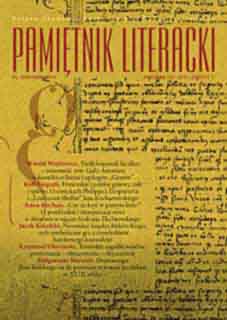Tarda loquendi facultas – tożsamość tzw. Galla Anonima w kontekście listów i epilogów „Gestów”
Tarda loquendi facultas – Gallus Anonymous’ Identity in the Context of Letters and Epilogues of “Gesta principum Polonorum”
Author(s): Witold WojtowiczSubject(s): Literary Texts
Published by: Instytut Badań Literackich Polskiej Akademii Nauk
Keywords: Gallus Anonymous; Gallus Anonymous' "Gesta"; "Gesta principum Polonorum"; letters and epilogues of "Gesta"
Summary/Abstract: Letters and epilogues of Gallus "Anonymous’ Gesta", in particular the topoi contained in them, form the subject of the article. The author builds a multicoloured set of topoi as based on his own cultural self-awareness with highly blurred references to social reality. Thus, most important in "Gesta" are such places which break conventions, fail to respect them or change attitude to them. A lively in the last decade debate over Gallus looses a lot without a renewed examination, in most general terms, of the realm of literary conventions and topoi. In conclusion, the author takes up the issue of anonymity of "Gesta" with special attention paid to the structure of letter preceding book III. Gallus is an example of the author whose work enters into a complex relationship with oral literature. "Gesta" might be seen as a (light) token of arising 12th century interest in chivalry romance. Gallus is equally skilful in taking advantage of literary traditions as in techniques of oral presentation, both of which he integrates into the text designed for quiet reading. Oral transmission of literature effects divest of its primary function and serves as a means of distancing and establishing fiction. The tension is built between conventional expression directed to listeners and the real mode of reception by the readers. Gallus felt the need to produce a highly literal and fictional "Gesta" in order to somehow dissociate form oral and orally transmitted vernacular epic. The letters became a means of defence against such transmission. The basic hindrance to explicit and reliable specification of intended and factual reception of "Gesta" should likewise be seen in the used conventions which interpreters many a time treated as a social reality while not all of Gallus’ expressions can be read verbatim.
Journal: Pamiętnik Literacki. Czasopismo kwartalne poświęcone historii i krytyce literatury polskiej
- Issue Year: 2013
- Issue No: 3
- Page Range: 5-38
- Page Count: 34
- Language: Polish

